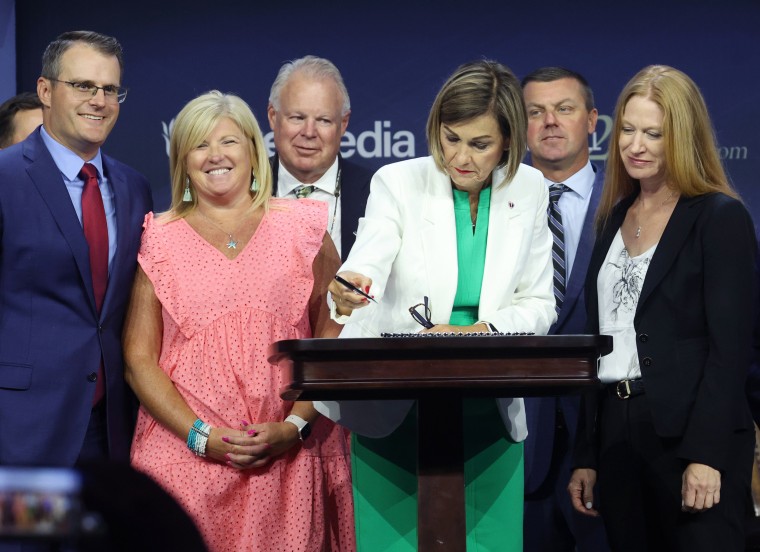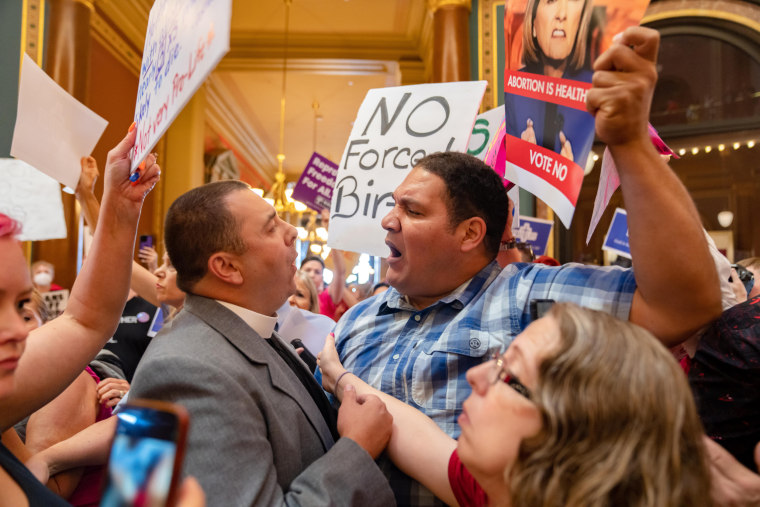Just weeks ago, Iowa conservatives lit up with excitement when Republican Gov. Kim Reynolds signed into law a new six-week abortion ban — an event she orchestrated shortly after the state Supreme Court ruled that an earlier six-week ban would remain blocked.
But much of the excitement has dimmed amid questions over whether a conservative justice, whose recusal in the first case led to that outcome, will again sit it out. Such a decision could, once more, scramble conservative efforts to keep the strict abortion law in place.
The concerns are the latest wrinkle in a complicated, yearslong quest by conservative Republicans in Iowa to enact a “heartbeat” bill, which would ban abortions at the sixth week of pregnancy or when, in some cases, a fetal pulse can first be heard via ultrasound. (The latest measure includes exceptions for the life of the woman, miscarriages and fetal abnormalities deemed by a physician to be “incompatible with life.”)
The storyline re-emerged in June when the state Supreme Court issued a 3-3 decision on a six-week abortion ban from 2018 — an unusual tie that, by default, preserved a lower court’s ruling blocking the ban.
The court’s seventh justice, Dana Oxley, a conservative Reynolds appointee, recused herself because her former law firm represented the Emma Goldman Clinic, an abortion and women’s health care clinic that was a plaintiff in the original case.
That prompted Reynolds to call a special session to pass a fresh six-week ban — which it did rapidly and which she signed to great fanfare at a prominent summit of conservative Christians.
But just as quickly, the scenario repeated itself: The same group of reproductive rights groups that sued to block the first ban — including the Emma Goldman Clinic — filed to block the latest ban. A state district court granted a temporary injunction, Reynolds’ administration appealed, and the case will soon be back in front of the state Supreme Court.
The winding journey now lands on a key question for court watchers: Will Oxley recuse herself again?
The answer is far from clear. But many conservatives in the state quietly suspect she will and are pessimistic about the prospects that their desired six-week ban will be upheld.
“There’s a good chance,” said a prominent conservative activist in Iowa, "that we’ll get another 3-3 tie.”
The activist, who requested anonymity to speak candidly about the issue, called the situation “disappointing” and “frustrating.”
Craig Robinson, a former political director of the Iowa GOP who now works as a political consultant in the state, said: “I’m in the camp of why wouldn’t she [recuse herself again]? Like, what’s really changed here?”
Others, however, hold out hope that she won’t and point to her participation in a recent procedural order in the case issued by the court that made no mention of a recusal.
“We don’t know for certain what will happen,” said Alan Ostergren, a Republican attorney who has in the past represented Reynolds’ administration in legal matters, “but the way the order read, it was signed by the chief justice for the court, and there was no noted recusal there.”
“That doesn’t mean that she couldn’t recuse in the future, but I take that as evidence that she will participate,” he added.
Nonpartisan political experts in the state point out that few laws govern Supreme Court recusal.
Justices who recuse themselves from specific cases aren’t required or obligated to make announcements that they have recused and why — nor do they typically do so, said Steve Davis, a spokesperson for the Supreme Court.
Rather, a justice who has recused from a case simply doesn’t show up at the bench during initial oral arguments. For example, no formal explanation was ever provided for Oxley’s recusal from the case on the 2018 ban; her connection to the clinic was reported in Iowa media outlets.
And even though the circumstances surrounding her recusal in the first case mirror those in the latest one, that doesn’t mean she would have to recuse again.
“Given that she had recused in the earlier case, would she feel obligated — not necessarily required, but obligated — to do so again? No,” Tim Hagle, a political science professor at the University of Iowa said.
But, he added, “if she didn’t recuse again, certainly she’s going to come under a certain amount of criticism for it.”

A spokesperson for Reynolds didn’t respond to questions.
The uncertainty means the issue is likely to be shrouded in mystery right up until the start of opening arguments — which haven’t been scheduled, Davis said. The court’s new session begins next month. Court watchers suspect a decision wouldn’t come until the very end of the term, in June.
Whether or not Oxley participates would, of course, have a dramatic impact on how the case is decided.
The split decision in June featured three justices suggesting they could support a legal standard — known as “rational basis” — that could allow a six-week abortion limit to stand in the future.
The three others essentially wrote that they supported upholding something called the “undue burden” standard — the approach that remains in effect for now.
Legal experts said it’s not impossible that some of those justices — all seven were appointed by Republican governors, including five by Reynolds since 2018 — could change their approach. Several factors are in play that could affect any such opinion. For example, while the U.S. Supreme Court effectively cut down the “undue burden” standard in its Dobbs ruling that overturned Roe v. Wade last year, that doesn’t necessarily mean the Iowa court would have to, as well, legal experts said.
In any outcome, a seventh justice’s participation would inevitably result in the clear majority needed for a legally binding decision.
Without Oxley, the possibility of another 3-3 tie remains.
That outcome would "just kick the can down the road again,” the conservative activist said.
Said Ostergren, the conservative attorney: "It certainly would be disappointing to have a case end in another 3-3 tie."

